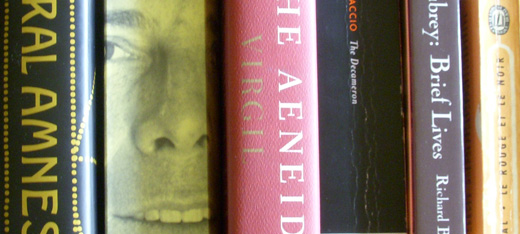Tuesday Morning Read
If I’m tardy today — too tardy to sip at Merrill — it’s because I wound up reading Boccaccio’s story of Rinieri the scholar aloud to Kathleen. Sleeping in and rousing late, she was nursing a cup of Kenya when I sat down to the Morning Read, and it seemed churlish not to read aloud, which entertained her so much that she didn’t start packing for Albany until long after she ought to have been out of the house.
¶ Decameron VIII, vii is one of the longest tales in the collection; amusingly, it consists mostly of oratory. Very little actually happens in this tale of revenge (or just punishment, as the avenger would have it): a scholar shuffles and shivers in a wintry courtyard, and a naked lady roasts atop a tower in the noonday sun. But the parties mock, supplicate, and scold each other with the greatest élan. Inserted into a feature film, it would make a great episode, a sort of inverted Cyrano.
¶ In the Aeneid, Aeneas is reminded that his right arm owes Evander and the shade of his late son, Pallas, the death of Turnus. Evander’s grief is as beautiful as his late son:
            Troum socia arma secutum
obruerent Rutuli telis! animam ipse dedissem
atque haec pompa domum me, non Pallanta, referret!
¶ In Aubrey, Richard Head, a bankrupt and bookseller who went by the name of Meriton.
He had been among the gipsies. He looked like a knave with his goggling eyes. He could transform himself into any shape.
And he charged twenty shillings the page… I’ll tackle the Herberts next time.
¶ In Le rouge et le noir, Julien keeps up his pretense of not loving Mathilde (the better to inflame her ardor); and, when at last he can bear it no more and pours out his passion, he has the temerity to deny it at once, as so much pretty speech, concocted for playing with the affections of another woman. Stendhal is now and then very funny:
Ce jour-là et les suivants, il sut cacher l’excès de sa félicité; il y eut des moments où il se refusait jusqu’au plaisir de la serrer dansa ses bras.
 But the whole business is so twisted and vain that it is difficult to care.
¶ In the little preface to a piece that’s only nominally about Sir Thomas Browne, Clive James explains the fame of this Seventeenth-Century writer as that of “one of those minor English prose writers whose reputations are always rediscovered in times of crises, because they had a gift for rhythm that forecast the language of the future, and it is in times of crisis that the England language is most easily seen to be a treasure house of humanism.” The piece itself, however, is all about book titles, except for one fabulous bit in which James tops himself for mad bibliophilia. It’s not enough to read Browne; we must read him Seventeenth-Century editions.
… but they are best studied in context, in the old edition of his work that you can find. The musculature of his style should be appreciated through time, as the beauty of a leopard should be seen through trees. For a writer like him, an anthology is a zoo of the bad old kind, where the animals were stymied behind bars or on concrete islands.

